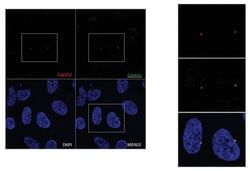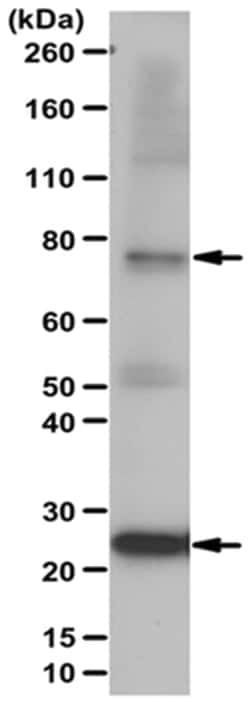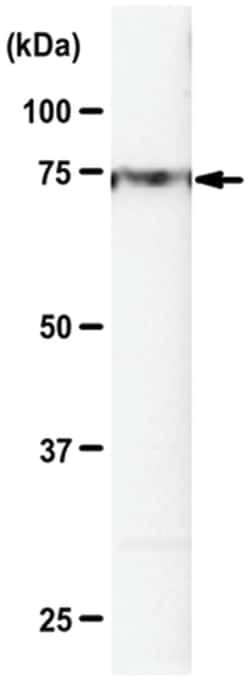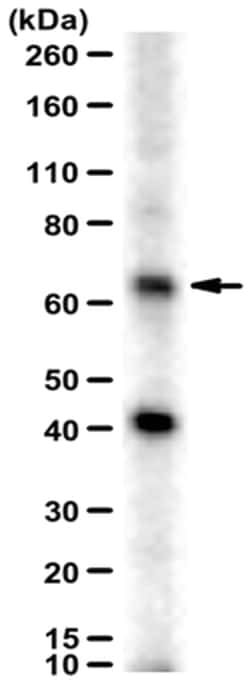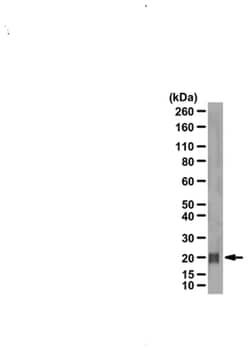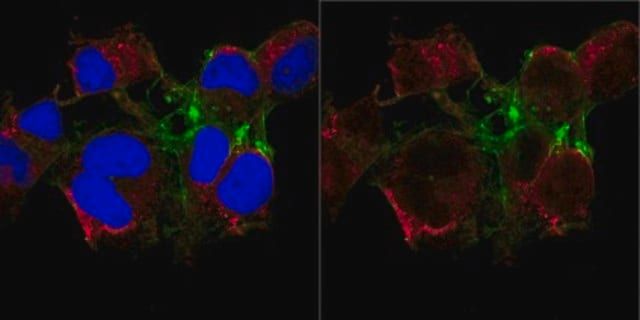MilliporeSigma™ CDC42, Rabbit, Unlabeled, Polyclonal,
Manufacturer: MilliporeSigma™
Select a Size
| Pack Size | SKU | Availability | Price |
|---|---|---|---|
| Each of 1 | ABN1646MI-Each-of-1 | In Stock | ₹ 38,958.86 |
ABN1646MI - Each of 1
In Stock
Quantity
1
Base Price: ₹ 38,958.86
GST (18%): ₹ 7,012.595
Total Price: ₹ 45,971.455
Antigen
CDC42
Classification
Polyclonal
Conjugate
Unconjugated
Gene
CDC42
Host Species
Rabbit
Purification Method
Affinity Purified
Regulatory Status
RUO
Primary or Secondary
Primary
Test Specificity
This polyclonal antibody is purified from an antiserum that has been shown to specifically detect recombinant human CDC42 brain isoform Cdc42-palm (UniProt P60953-1) with or without C188S mutation, but not the placenta isoform Cdc42-prenyl (UniProt P60953-2) by Western blotting analysis (Kang, R., et al. (2008). Nature. 456(7224):904-909). Note that the designation of CDC42 isoform 1 and 2 by Kang et al. (2008) is the exact opposite of that by UniProt P60953 (human) and P60766 (mouse), while both Kang et al. (2008) and UniProt Q8CFN2 (rat) designate the rat CDC42 brain isoform as isoform 2.
Content And Storage
Stable for 1 year at -20°C from date of receipt. Handling Recommendations: Upon receipt and prior to removing the cap, centrifuge the vial and gently mix the solution. Aliquot into microcentrifuge tubes and store at -20°C. Avoid repeated freeze/thaw cycles, which may damage IgG and affect product performance.
Applications
Western Blot
Concentration
Please refer to lot specific datasheet.
Formulation
Purified rabbit polyclonal antibody in PBS without preservatives.
Gene Accession No.
P60953-1
Immunogen
Synthetic peptide corresponding to the C-terminal end sequence of mature human CDC42 brain isoform.
Quantity
100 μg
Research Discipline
Neuroscience
Gene ID (Entrez)
NP_426359
Target Species
Human
Related Products
Description
- Cell division control protein 42 homolog (UniProt: P60953; also known as G25K GTP-binding protein) is encoded by the CDC42 gene (Gene ID 998) in human
- CDC42 homolog is a plasma membrane-associated small GTPase that cycles between an active GTP-bound and an inactive GDP-bound state
- Its activity is regulated by guanine nucleotide exchange factors (GEFs), which promote the exchange of bound GDP for free GTP, GTPase activating proteins (GAPs) that increase the GTP hydrolysis activity, and GDP dissociation inhibitors, which inhibit the dissociation of the nucleotide from the GTPase
- In the active state it binds to a variety of effector proteins to regulate cellular responses
- Cdc42 is known to regulate the dynamic organization of the cytoskeleton and membrane trafficking for physiologic processes such as cell proliferation, motility, polarity, cytokinesis and growth
- Deregulation of Cdc42 is found in several pathogenic processes such as cancer, cardiovascular diseases, and neuronal degenerative diseases
- It is involved in epithelial cell polarization processes and regulates the bipolar attachment of spindle microtubules to kinetochores before chromosome congression in metaphase
- During the prometaphase stage, it localizes to spindle and moves to the central spindle as cells progress through anaphase to telophase.
